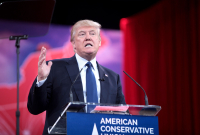Support strong Canadian climate journalism for 2025
WASHINGTON — A winner amongst Republicans and a big loser with the general public: according to a new poll, that's the apparent net effect of Donald Trump's controversial plan for a ban on Muslim travel.
In findings that could hold significance for the 2016 U.S. election, the poll suggests a plurality of Republicans favour his plan for a religious control at the border — but not the broader American public.
The NBC-Wall Street Journal survey suggests 25 per cent of Americans support the idea, 57 per cent oppose it and 18 per cent are not sure about a policy that has prompted a torrent of international condemnation.
"It does indicate Trump has limited potential in a general election," said Fred Yang, a Democratic pollster who presented the survey on NBC with a Republican colleague, Micah Roberts.
But in one crucial detail, which is relevant to the fast-approaching presidential primaries, it appears the policy might not hurt his standing with the people who will soon pick the Republican nominee.
On the contrary: The survey said 42 per cent of self-identified Republicans expressed support for the idea, 36 per cent opposed it and 22 per cent weren't sure.
The question on Trump's Muslim proposal was asked Dec. 8-9 of 495 respondents and result has a margin of error of plus or minus 4.4 percentage points.
It appears a sense of panic has begun setting in within the Republican brass over the prospect of Trump winning the nomination, as he continues to lead intra-party surveys with less than two months before primaries begin.
The Washington Post reported Thursday that senior figures within the party have begun planning the possibility of their first brokered convention since 1976.
The newspaper said about 20 of them gathered this week at a Washington restaurant where they discussed the mechanics of an old-school convention, where party delegates would coalesce around a winner.
In that last brokered convention, the establishment rallied around incumbent president Gerald Ford to block then-insurgent Ronald Reagan.
Trump told the paper that such a process would hurt him.
"I'll be disadvantaged," Trump told the Post. "My disadvantage is that I'd be going up against guys who grew up with each other, who know each other intimately and I don't know who they are, okay?... These kind of guys stay close. They all know each other. They want each other to win."
Trump has mused about another threat sure to send chills down Republican spines: the possibility of mounting a third-party candidacy, should he feel that he's been treated unfairly.
He floated the idea, then signed a pledge ruling it out, and he's begun raising it again this week since numerous party elders lambasted his Muslim-exclusion plan.
Trump still has a few months to make up his mind on an independent run, said a leading expert on laws for third-party challenges.
"It takes time to complete petitions," said Richard Winger, who runs the website Ballot Access News, which chronicles the various hurdles to independent candidacies that the two established parties have set up in various states.
"Trump would need to decide in March, if he wanted to be on in all states. But... (John B.) Anderson got on in all 50 (states in 1980) and he didn't start until April 24."
A Trump third-party bid could prove devastating to Republicans. Polls suggest many Republican voters would stick with him, with the split benefiting Democrats.
As for the details of his Muslim policy, they keep changing. He's described it as a temporary ban on Muslim travel to the U.S., but has changed his story several times about who might be exempted from it.
Alexander Panetta, The Canadian Press



Comments